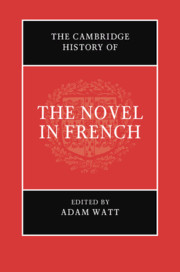Book contents
- The Cambridge History of the Novel in French
- The Cambridge History of the Novel in French
- Copyright page
- Contents
- Figures
- Contributors
- Acknowledgements
- Note on Conventions
- Chronology
- Introduction
- Part I Beginnings: From the Late Medieval to Madame de Lafayette
- Part II The Eighteenth Century: Learning, Letters, Libertinage
- 7 The Early French Novel and the Circum-Atlantic
- 8 Anglo-French Relations and the Novel in the Eighteenth Century
- 9 The Fiction of Diderot and Rousseau
- 10 The Memoir Novel
- 11 Epistolary Fiction: The Novel in the Postal Age
- 12 The Libertine Novel
- 13 Sade and the Novel
- Part III After the Revolution: The Novel in the Long Nineteenth Century
- Part IV From Naturalism to the Nouveau Roman
- Part V Fictions of the Fifth Republic: From de Gaulle to the Internet Age
- Index
- References
11 - Epistolary Fiction: The Novel in the Postal Age
from Part II - The Eighteenth Century: Learning, Letters, Libertinage
Published online by Cambridge University Press: 04 February 2021
- The Cambridge History of the Novel in French
- The Cambridge History of the Novel in French
- Copyright page
- Contents
- Figures
- Contributors
- Acknowledgements
- Note on Conventions
- Chronology
- Introduction
- Part I Beginnings: From the Late Medieval to Madame de Lafayette
- Part II The Eighteenth Century: Learning, Letters, Libertinage
- 7 The Early French Novel and the Circum-Atlantic
- 8 Anglo-French Relations and the Novel in the Eighteenth Century
- 9 The Fiction of Diderot and Rousseau
- 10 The Memoir Novel
- 11 Epistolary Fiction: The Novel in the Postal Age
- 12 The Libertine Novel
- 13 Sade and the Novel
- Part III After the Revolution: The Novel in the Long Nineteenth Century
- Part IV From Naturalism to the Nouveau Roman
- Part V Fictions of the Fifth Republic: From de Gaulle to the Internet Age
- Index
- References
Summary
With the expansion of the postal system from the mid seventeenth century, there was a growing interest in epistolary writing. Like real letter writers, authors of early epistolary novels focus on the material conditions of communication by letter. The most common plot devices have to do with what can go wrong in the postal system. Letter novels typically present themselves as a collection of real letters, a packet that has been lost and found, or entrusted to a friend who arranged for their publication. Epistolary fiction appealed to readers newly fascinated with how intimate thoughts could be expressed in writing, and what pleasure, as well as utility, could be drawn from reading the private thoughts of others. The letter novel was also congenial to some of the core aspirations of Enlightenment thought: a commitment to dialogical thinking, an openness to cultural difference, the notion of a ‘Republic of letters’ formed by conversational exchange between educated people who were often geographically separated. While epistolary fiction declined in popularity in the nineteenth century, letter novels have continued to resurface as experiments in narrative form, well suited to exploring contrasting subjectivities and the endless opportunities for failed and interrupted communication in the modern world.
Keywords
- Type
- Chapter
- Information
- The Cambridge History of the Novel in French , pp. 204 - 219Publisher: Cambridge University PressPrint publication year: 2021

